Hey, enough already!
That’s me, yelling at my overactive brain, demanding it to stop running on a never-ending hamster wheel.
If you’re a chronic, semi-chronic, or recovering overthinker, let me assure you, with practice and persistence, you can train your mind to stop going haywire all the time.
You can develop the skill to keep your mind calm and clear.
So, cut yourself some slack and don’t be too harsh on yourself for your tendency to dwell on things.
Remember, overthinking isn’t always a bad thing.
Imagine the last time you were choosing your next holiday destination, meticulously comparing hotels, and weighing your options.
Overthinking can sometimes save you from making a hasty decision or help you prepare for different scenarios.
But when overthinking spirals into an unhelpful mental quagmire, it can wreak havoc on your life, fueling anxiety and stress.
Those relentless thoughts of:
Our minds keep rewinding past events that we can’t change, and it’s time to put an end to it.
When you’re consumed with self-doubt and regret, overthinking can disrupt your life, but there’s hope.
The good news is that overthinking isn’t permanent.
You can train your brain to stop overthinking and worry less. You can learn to calm your mind, relax instantly, and reduce stress quickly.
Drawing from my experience, I believe everyone can learn to live in the present and stop overthinking.
In this post, I will share five effective ways I’ve used to stop myself from overthinking and start living in the moment.
But before we dive into the strategies, let’s first recognise the signs of overthinking.

The Telltale Signs of Overthinking
Be aware of these common symptoms of overthinking, as they can indicate that you’re caught up in negative thought patterns:
Now that we know the signs, let’s explore the strategies to combat overthinking and embrace the present.
1. Nip Overthinking in the Bud and Halt Its Momentum
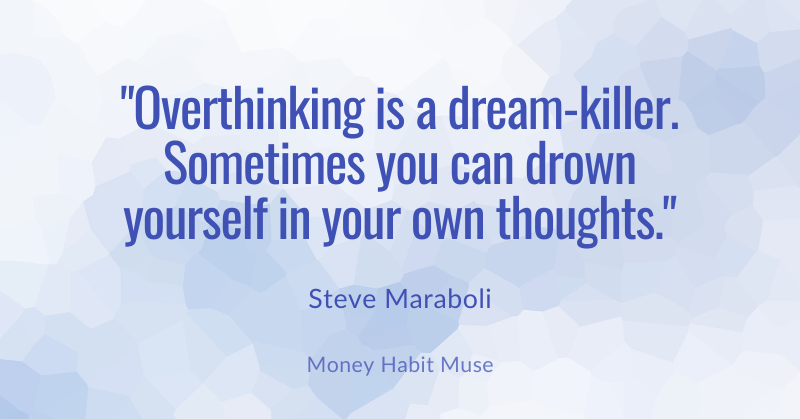
Overthinking is a dream-killer. Sometimes you can drown yourself in your own thoughts.
Steve Maraboli
The instant I catch myself overthinking, I say it out loud:
Doing so disrupts the flow of overthinking right then and there, pulling you back from the brink of mental chaos and into the present.
Whether it’s rooted in perfectionism or stress and doubt over past or future events, recognise the moment you start overthinking.
Catch it early and put a stop to it before being sucked into a vortex of thoughts that’ll leave you feeling drained.
2. Swap Out Your Thoughts for More Constructive Ones
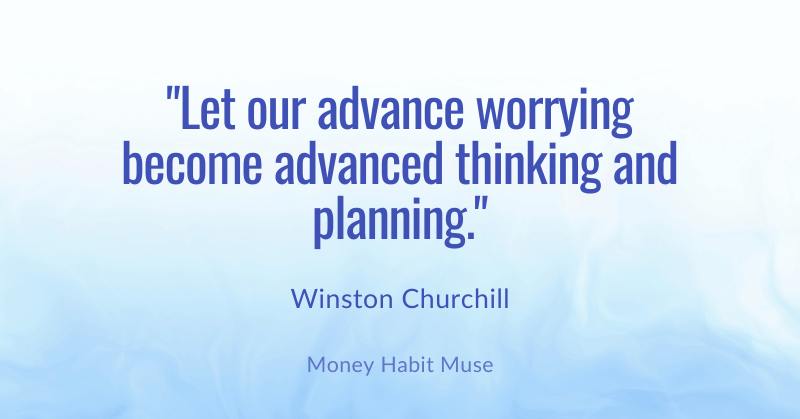
Let our advance worrying become advanced thinking and planning.
Winston Churchill
Remember the night before your first job interview?
I do, and I was a nervous wreck.
“What if I botch the interview and don’t get the job?“
I couldn’t understand why I kept revisiting that anxious place, knowing it did me no good.
It only fueled my already apprehensive mind.
Every second, my anxiety about the upcoming interview seemed to double, then triple.
I needed to calm down and clear my mind.
So, I deliberately started shifting my focus to “how I’d feel when I’m offered the job.“
Slowly but surely, the mood and energy began to change.
I then diverted my attention from unhelpful worries and anxiety to productive research, learning about the company and preparing for potential interview questions.
When you recognise that you’re overthinking, replace your thoughts with something positive and engage in constructive action. Take advantage of the fact that we can only have one thought at a time.
? Watch this hilarious Will Smith talk: I guarantee you’ll love it! He brilliantly demonstrates how we (and our worries) can waste our time for… precisely nothing.
3. Designate a Time Slot for Overthinking
Thinking too much leads to paralysis by analysis. It’s important to think things through, but many use thinking as a means of avoiding action.
Robert Herjavec
Another trick I use when I catch myself caught in an overthinking loop is to allocate a specific time slot for overthinking, for example, 12:00-12:15.
When I’m derailed from my task by overthinking, I tell myself:
And I only revisit “the issue” at the assigned time.
This allows me to stay present and focus on the task at hand.
When the designated time comes, I jot down all my thoughts.
If there are things I can do something about, I get started right away.
I pick up the phone and discuss the issue that’s been bothering me with a friend, for example.
Things that I can’t do anything about?
I cross them off.
I’ve given it some thought and decided to let it go.
4. Ditch Assumptions and Pursue Facts
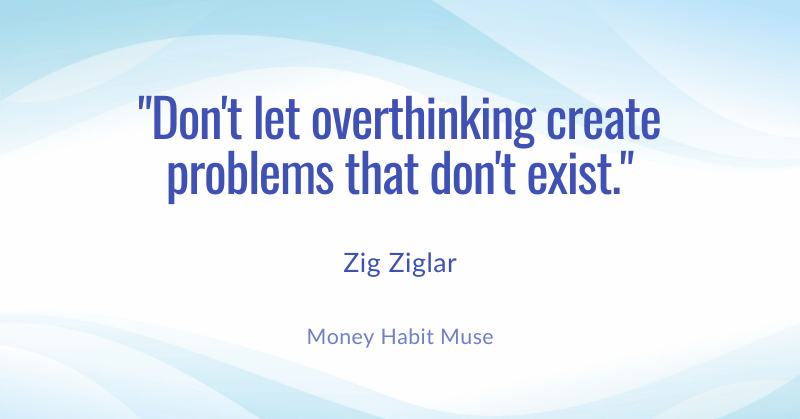
Don’t let overthinking create problems that don’t exist.
Zig Ziglar
I recall the countless sleepless nights spent worrying about my mounting debt.
Overthinking just reinforced the worst-case scenario, causing me stress, worry, and anxiety.
One phone call revealed that my situation was resolvable—it was simply different from what I had assumed.
Companies were understanding and willing to work with me.
All those worries and overthinking were for nothing.
Your partner’s recent mood swing may have nothing to do with you.
Your assumptions about your annual performance appraisal could be entirely wrong until you talk to your supervisor.
I’ve learned that jumping to conclusions always leads to overthinking.
I now train myself to seek facts through direct communication and avoid entertaining assumptions.
It has allowed me to stop overthinking and start living in the present.
5. Monitor Your Energy Flow
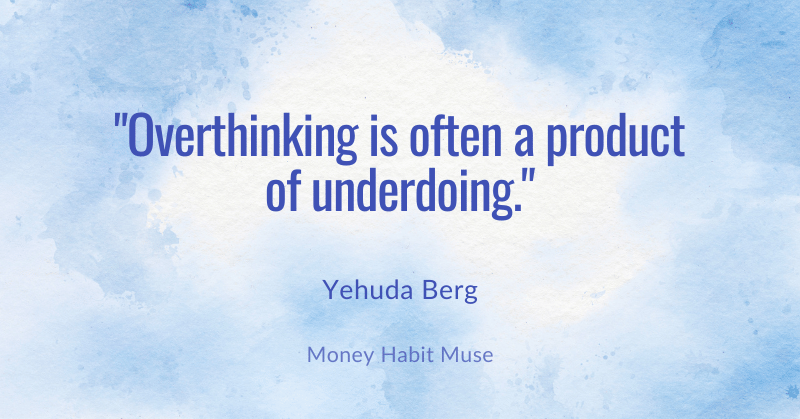
Overthinking is often a product of underdoing.
Yehuda Berg
Just like everyone has 24 hours in a day, we only have a limited amount of energy each day.
When we focus on one thing, something else has to give.
So, I became conscious of what other important aspects of my life I might be neglecting while my energy is being spent on overthinking.
I keep reminding myself that I can control where I place my awareness at any given moment.
We have the luxury of choosing what to focus on. No one is pointing a gun at us and telling us to overthink while neglecting other important aspects of our lives.
Overthinking and worrying are our own doing; therefore, we can undo them.
It may seem hard at first.
But start by observing where you’re letting your energy flow.
Keep redirecting it back to the correct paths each time it goes off track.
You’ll soon learn to stop overthinking and relax.
Final Thoughts on Stopping Overthinking and Embracing the Present
Overthinking can affect our mental and physical well-being in destructive ways, but we have the power to tame it and calm our minds.
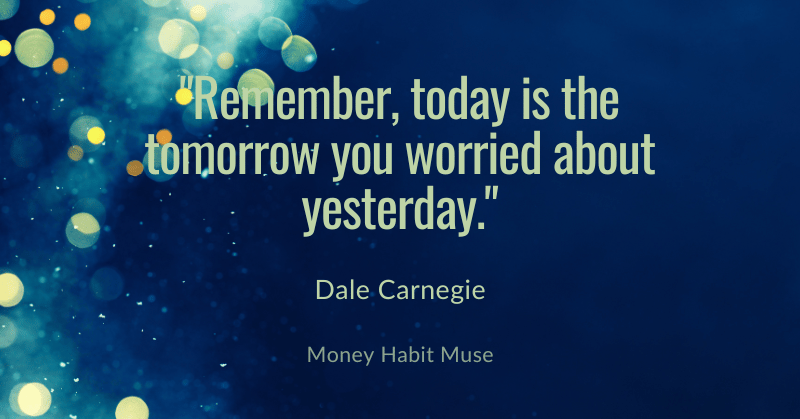
Remember, today is the tomorrow you worried about yesterday.
Dale Carnegie
Despite all our worries and stress from yesterday’s overthinking, nothing we imagined happened today.
Use these 5 effective ways to stop overthinking in this post to put an end to today’s overthinking and welcome tomorrow with a lighter heart.
With repeated practice, you can stop overthinking your life and start living in the present moment.
You Might Also Enjoy…
Share this post ❤ 😊 🙏


Thank you so so much! I can really relate to this a lot because I suffer from overthinking and anxiety! I really love this! Amazing tips ?